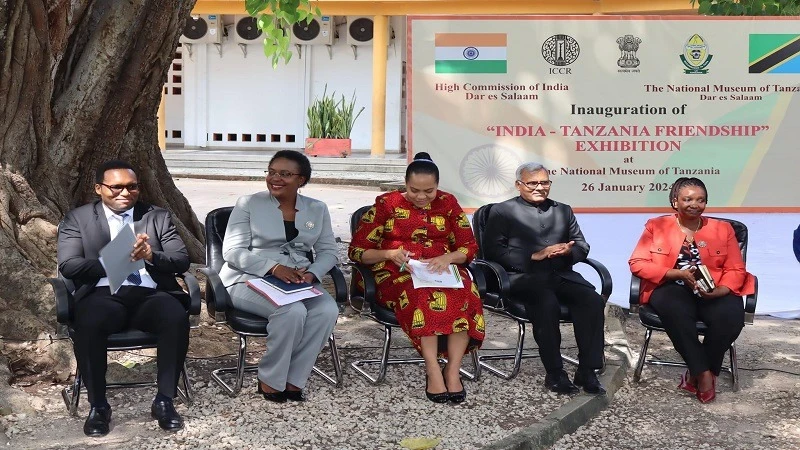
By Guardian Reporter , The Guardian
On April 26th each year, Tanzania erupts in joyous celebrations, marking Union Day, a momentous occasion commemorating the merger of Tanganyika and Zanzibar. Yet, beyond its mere historical significance, the day serves as a poignant reminder of the profound values embedded in the Tanzanian spirit – values of inclusivity,
diversity, and patriotism. On April 26th each year, Tanzania erupts in joyous celebrations, marking Union Day, a momentous occasion commemorating the merger of Tanganyika and Zanzibar. Yet, beyond its mere historical significance, the day serves as a poignant reminder of the profound values embedded in the Tanzanian spirit – values of inclusivity, diversity, and patriotism. On April 26th each year, Tanzania erupts in joyous celebrations, marking Union Day, a momentous occasion commemorating the merger of Tanganyika and Zanzibar. Yet, beyond its mere historical significance, the day serves as a poignant reminder of the profound values embedded in the TanzaniaIt stands as a testament to the visionary aspirations of the late Mwalimu Julius Kambarage Nyerere, the revered father of the nation, who envisioned Tanzania not merely as a geographical entity, but as a unified mosaic where unity and solidarity transcend tribal, ethnic, ancestral, or linguistic differences, fostering a shared Tanzanian identity.
Union Day encapsulates the realization of Nyerere's dream – a nation where individuals from over a hundred tribes seamlessly interweave into the vibrant tapestry of Tanzanian identity. As Tanzania joyously marks the 60th anniversary of Union Day, it proudly displays the embodiment of Nyerere's vision, with Tanzanians embracing their common national identity above all else, exemplifying unity in diversity.
Among the myriad communities contributing to the rich tapestry of Tanzanian nationality are Tanzanians of Indian origin, whose historical roots are deeply entrenched in the country's landscape. For centuries, Tanzanians of Indian descent have played pivotal roles as traders, entrepreneurs, professionals, and patriots, enriching society in multifaceted ways.
One such towering figure is Amir Habib Jamal, a staunch Tanzanian patriot entrusted by Nyerere to spearhead critical initiatives like Air Tanzania and the Tanzania Railroad Corporation as Minister for Works, Transport and Communication.
Jamal's journey, from advocating for the ‘Quit India Movement’ alongside Gandhi to becoming a cornerstone of Tanzanian leadership, epitomizes the invaluable contributions and unwavering patriotism of the Indian-Tanzanian community.
Tanzanians of Indian origin have imprinted indelible marks across various sectors – from business and government service to academia, law, and politics. Figures like Jamil and Mama Shamim Khan exemplify the trust bestowed upon them by fellow Tanzanians to represent their interests, underscoring the community's integration and acceptance within Tanzanian society.
Moreover, a significant number of industries in Tanzania have been established by Tanzanians of Indian origin, bolstering Tanzania’s economic prosperity while creating employment opportunities for their compatriots, thus contributing to the nation's growth and development.
To celebrate and honour this rich heritage, the High Commission of India in Dar es Salaam collaborated with the National Museum of Tanzania to curate India-Tanzania Friendship Exhibition. Additionally, a seminar organized by the High Commission meticulously documented the significant contributions of the Indian diaspora in Tanzania, drawing wide participation from academia, think tanks, political leaders and community leaders alike, fostering deeper understanding and appreciation of their role in Tanzanian society.
Reflecting on Tanzania's journey, one cannot help but envision Mwalimu Nyerere's pride at the nation's progress. As Union Day celebrations unfold, his values continue to shape Tanzania's trajectory, paving the way towards a stronger, more united, and inclusive nation. With each passing year, Union Day serves not only as a commemoration of Tanzania's rich history but also as a beacon of hope for a future guided by the enduring principles of unity, diversity, and patriotism.
Union Day stands as a testament to the resilience and unity of the Tanzanian people, a celebration of their collective identity and aspirations for a brighter tomorrow. As Tanzania strides forward, it does so with the spirit of Union Day deeply ingrained in its national consciousness, fostering a sense of belonging and togetherness among its citizens, transcending boundaries of diversity and embracing the richness of its multicultural fabric.




No comments :
Post a Comment